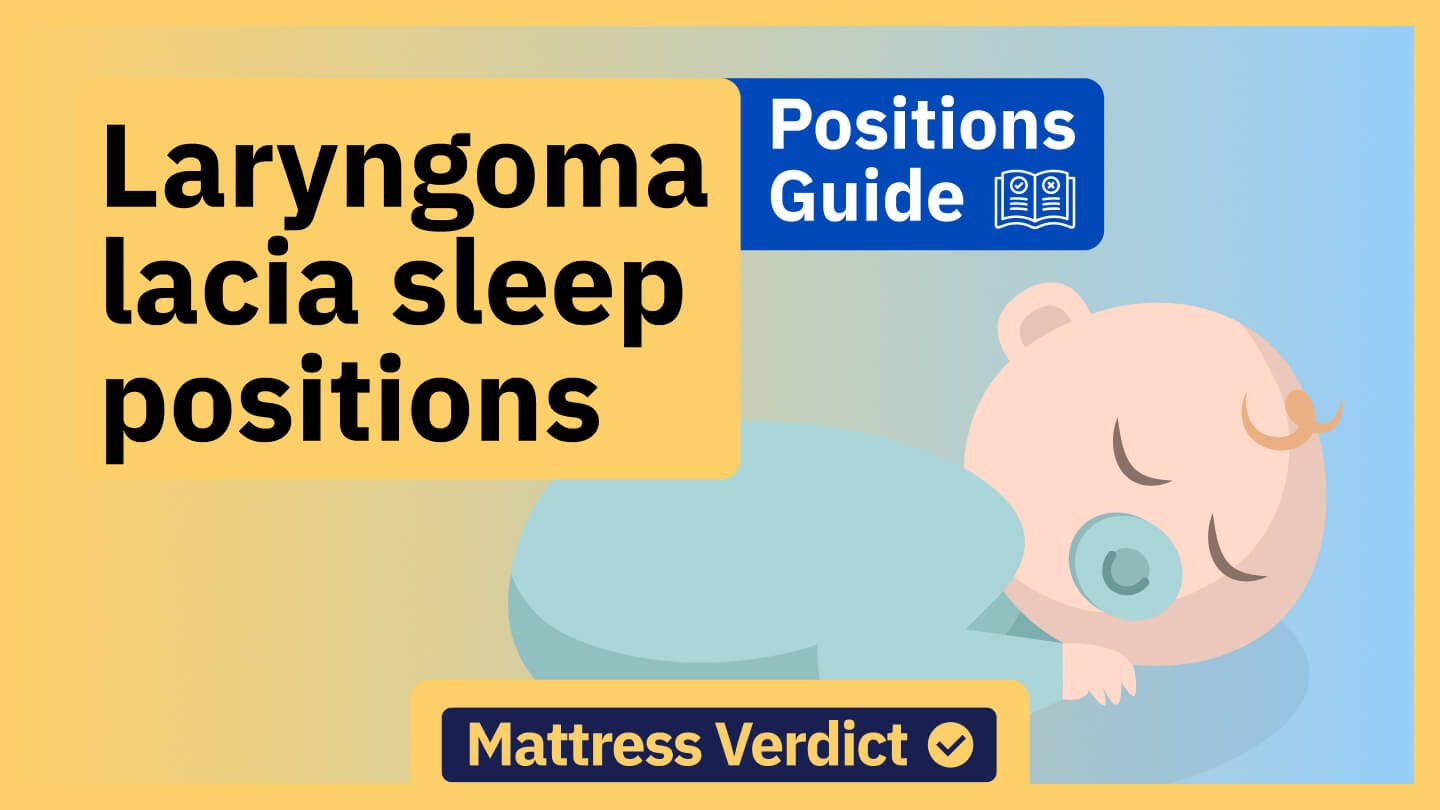

Coughing can be a persistent and disruptive hindrance, especially when it decides to strike in the middle of the night, robbing you of much-needed rest. Sleep positions to stop coughing play a crucial role in managing this nighttime annoyance. In this ultimate guide, we'll delve into the best sleeping position to clear your lungs, stop coughing, and ensure a peaceful night's sleep. Let's explore the nuances of achieving optimal rest even when plagued by a stubborn cough.
Key Takeaways
-
Your sleeping position can minimize your coughing during sleep
-
Some of the causes and symptoms of nighttime coughs include postnasal drip, dry cough, asthma, allergies, and excess mucus production
-
You can adopt alternative approaches and remedies such as steam inhalation, dust mite management, and proper hydration, which aim to soothe your pesky nighttime coughs and promote respiratory health
Best Sleeping Positions for Chest Congestion and Coughing
1. Sleeping on Your Side
One of the most beneficial and perhaps the best position to sleep with a cold and cough is on your side. This position can help clear mucus from your airways, preventing it from pooling in your throat and causing irritation. Place a pillow between your knees to align your spine and enhance comfort. Many health professionals consider this the best sleeping position for a cough.
2. Elevated Head Position
Does elevating the head help with coughing? Well, dealing with a persistent cough can significantly disrupt your sleep, but adjusting your sleeping posture might offer some relief. When struggling with a cough, the right sleep position can help minimize discomfort and enhance breathing.
For instance, many find that sleeping with their head elevated on extra pillows can reduce the severity of coughing at night. Elevating your head is a tried-and-true method for managing nighttime coughs. It is the best position to sleep in when dealing with a mucus cough, preventing the mucus from flowing into your throat and reducing the urge to cough.
Prop yourself with an extra pillow or invest in an adjustable bed for optimal elevation.
If you need help finding the right mattress and pillow combo for your needs, have a look at our Mattress Verdict quiz for some personalized recommendations for your weary head.
3. Sleeping on Your Stomach
In our search for remedies to ease the nightmare of bedtime coughing, a common question arises: does sleeping on the stomach help with a stubborn cough?
Exploring the effects of a coughing sleeping position reveals various benefits associated with sleeping on the stomach. Surprisingly, it can be an effective sleeping position for cough elimination. This position may help prevent postnasal drip, a common culprit behind nighttime coughs. Use a thin pillow to avoid straining your neck. This is also considered one of the best sleeping positions for sleep apnea.
Now while this is an excellent position to adopt for reducing your coughing, just be cautious of some unwanted side effects that may worsen conditions such as GERD or acid reflux. Laying on your belly can potentially allow stomach acid to creep back up into the esophagus, leading to some discomfort and irritation.
Another problem to watch out for is your neck positioning as this one can force your neck out of its natural posture, which isn't great for your spine's alignment. So all in all, if you ever find yourself looking for the best way to sleep to stop coughing, be sure to give this one a try, just be cautious and keep an eye on any discomfort or worsening symptoms.
4. Legs Elevated
When seeking the best way to stop coughing, consider sleeping with your legs elevated to promote better blood circulation and reduce pressure on your chest. This is especially beneficial for those wondering how to sleep with chest congestion. Experiment with different elevation levels to find the most comfortable position for you. The quest for the best sleeping position for chest congestion and a persistent cough becomes paramount in these moments of nightly disruption.
Causes and Symptoms of Nighttime Coughs
Understanding the root causes of nighttime coughs is crucial and can help you discover the best sleeping position for cough management. Here are some common triggers and symptoms:
Postnasal Drip
Postnasal drip, where mucus drips down the back of the throat, is a leading cause of nighttime coughs. It can be triggered by allergies, sinus infections, or colds. To avoid this, you should find the best position to sleep when you have a cold.
Dry Cough
A dry cough, often worsened at night, can result from environmental factors like dust mites, irritants, or exposure to allergens. Finding the best position to sleep with a dry cough is crucial if you value a good night’s sleep.
Asthma
Individuals with asthma may experience nighttime coughing due to increased airway sensitivity. If your doctor has recommended one, it is paramount to use an inhaler at the right intervals. These can open up the air passages, improving the airflow and minimizing your cough.
Allergies
Allergies to pollen, pet dander, or dust are yet another factor that can lead to nighttime coughing and discomfort.
Mucus
Excessive mucus production, often a result of respiratory infections, can lead to persistent coughing, particularly when lying down. This is another case where sleeping with your legs elevated really helps.
Remember, effective management begins with identifying the specific cause of your nighttime cough.
Alternative Remedies to Soothe Nighttime Coughs and Improve Respiratory Health
In addition to adopting the best sleeping position for phlegm, consider these alternative remedies to enhance respiratory health:
Hot Water
Inhaling steam from hot water can soothe your airways and relieve nighttime coughing. Add a few drops of eucalyptus oil for an extra respiratory boost.
Dust Mites Management
Invest in allergy resistant (hypoallergenic) bedding and regularly clean your living space to minimize exposure to dust mites, a common trigger for nighttime coughs.
Hydration
Ensuring you are well hydrated helps decrease your mucus levels, making it easier to expel. Drink plenty of water throughout the day to support respiratory health.
Elevating Legs
As mentioned earlier, elevating your legs can reduce pressure on your chest, aiding in better breathing and reducing coughing episodes. Children and toddlers can also benefit from this practice, so be sure to check out more tips for the best laryngomalacia sleep positions.
Conclusion
In conclusion, achieving a peaceful night's sleep amidst a severe coughing bout involves strategic choices in sleep positions and lifestyle adjustments. For those struggling with persistent coughing, discovering the best sleep position when coughing can be a godsend.
Navigating the realm of sleep amidst persistent health conditions involves a strategic exploration of various sleeping positions. From the best sleeping position for chest congestion to discovering the best sleeping position to stop coughing, each adjustment fosters a more serene and uninterrupted evening's sleep.
Don’t be afraid to experiment with the best sleeping positions for coughing to find what works best for you, and consider incorporating alternative remedies to enhance respiratory health. If your nighttime cough persists or worsens, seeking guidance from your doctor is essential. Remember, a well-rested night contributes significantly to your overall well-being, so prioritize your sleep for optimal health and good luck on your journey to finding the best sleeping position for coughing. Sweet dreams!
Frequently Asked Questions
Why is coughing worse at night?
Nighttime coughing worsens due to the horizontal position of sleeping, allowing mucus to accumulate in the throat. Additionally, environmental factors, such as allergens or postnasal drip, tend to intensify during sleep, contributing to the increased severity of coughing episodes in the nocturnal hours, making the quest to find the best position to sleep when coughing feel even more challenging.
How do you stop an uncontrollable cough?
To quell an uncontrollable cough, try changing your sleeping position, staying hydrated, and using remedies like steam inhalation, as these measures can alleviate irritation. Persistent coughs warrant professional consultation for a more comprehensive evaluation and tailored guidance on managing the relentless urge to cough. Do this, and you’ll be one step closer to adopting the best sleeping position for a cough.
Does holding in a cough help?
Suppressing a cough may offer temporary relief, but holding it in can heighten discomfort. It's generally advisable to let the body expel irritants naturally. Allowing the coughing reflex to flow without restraint often leads to a more effective and less distressing resolution, promoting overall respiratory well-being.
How do I know if my cough is serious?
Distinguishing the seriousness of a cough involves noting accompanying symptoms like chest pain or difficulty breathing. Persistent coughs with such indicators may signal a more critical condition, necessitating consultation with a healthcare professional or your trusted general practitioner for a thorough evaluation and personalized guidance on managing potential underlying issues.
How long does a cough last?
The duration of a cough can vary based on its underlying cause. While some resolve within weeks, persistent coughs lasting over three weeks may indicate an underlying issue. Seeking medical attention ensures a comprehensive evaluation, leading to tailored advice on managing and alleviating the cough's persistence for a healthier breathing experience.




